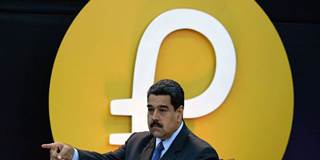With inflation skyrocketing, infrastructure crumbling, crime running rampant, and hunger spreading, Venezuela's situation is bleak, and shows no signs of improving. The question for the rest of the world is how bad conditions should be allowed to get before intervening.
NEW YORK – The New York Times recently reported that US President Donald Trump’s administration had held meetings with rebellious Venezuelan military officers who were plotting to overthrow Nicolás Maduro’s government. In the end, US policymakers backed off the idea; but, not surprisingly, the reaction to the article was mostly negative.
To be sure, there are good reasons to oppose a US-supported coup in Venezuela. Many of those likely to be involved would have unsavory reputations, given their ties to the drug trade and their record of human-rights violations. A coup would almost certainly fail, giving an already repressive government a new justification to crack down on its opponents.
Another option would be an armed intervention led by Venezuela’s neighbors. They are adversely affected by the flow of refugees, which already numbers 2-4 million and is growing at a rate of 50,000-100,000 per month. If these countries took the lead, they would not have the political baggage of a US-led military operation.

NEW YORK – The New York Times recently reported that US President Donald Trump’s administration had held meetings with rebellious Venezuelan military officers who were plotting to overthrow Nicolás Maduro’s government. In the end, US policymakers backed off the idea; but, not surprisingly, the reaction to the article was mostly negative.
To be sure, there are good reasons to oppose a US-supported coup in Venezuela. Many of those likely to be involved would have unsavory reputations, given their ties to the drug trade and their record of human-rights violations. A coup would almost certainly fail, giving an already repressive government a new justification to crack down on its opponents.
Another option would be an armed intervention led by Venezuela’s neighbors. They are adversely affected by the flow of refugees, which already numbers 2-4 million and is growing at a rate of 50,000-100,000 per month. If these countries took the lead, they would not have the political baggage of a US-led military operation.